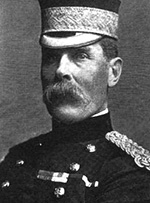Lord Paul Sanford Methuen

Engelsk general.
- Modder-floden, 1899
- Magersfontein, 1899
Paul Sanford Methuen, the Third Baron Methuen.
Paul Sanford Methuen was born September 1, 1845 at Corsham Court, Wiltshire, the oldest of three sons of Frederick Henry Paul Methuen (2nd Baron Methuen) and his wife Anna Horatia Caroline Sanford. He was educated at Eton, served two years in the Royal Wiltshire Yeomanry, joined the Scots Fusilier Guards as Ensign and Lieutenant and the Captain in Dec. 1867; Captain and Lieutenant-Colonial in July 1876, and regimental Major in Oct 1882. He also served as adjutant of the 1st battalion from August 1864 until November 1871, held several staff positions such as brigade major, Home District from 1871-1878, military attache' in Berlin (1878-1881), assistant adjutant and quartermaster general, Home District (1881-1884), and deputy adjutant-general, in South Africa (1888-1890). He saw active duty at Amoaful in the Ashanti campaign of 1873-1874 on the staff of Sir Garnet Wolseley and was the commandant of headquarters in Eqypt for three months in 1882, being present at the Battle of Telet-Kebir. He became brevet-colonel in 1881 and served in the expedition of Sir Charles Warren to Bechuanaland in 1884-1885, where he commanded Methven's Horse, a corps of mounted rifles. He was promoted to substantive colonial in 1888, major-general in May of 1888, and commanded the Home District from 1892-1897. He served in 1897 as press censor at headquarters on the Tirah expedition and was promoted to lieutenant-general in April 1898. He was then given the command of the 1st Division on the outbreak of the South African War.
Paul Methuen reached South Africa in November 1899 and chased the Boers from Belmont and Graspan. He was slightly wounded at Modder River. He suffered some disappointments and some successes during the war, but was relentless in chasing the Boers. He was captured, badly beaten and wounded at Tweebosch on March 7, 1902. Methuen was appointed colonial of the Scots Guard in May, 1904, then general and in June was given the command of the IV Army Corps. He became instrumental in helping raise the standards of training of the British Expeditionary Force in 1914. In April, 1908, he was appointed general officer commanding-in-chief in South Africa, which he hed until 1912. He was a popular with his troops as well as his former opponents, and helped improve relations between the British and the Boers, to give the Union of South Africa a good start. He was govenor and commander-in-chief of Natal in 1910 and was promoted to field-marshal in June, 1911. At age 70 in February 1915, he was appointed governor and commander-in-chief of Malta until he retired in May, 1919. Returning to England he was appointed constable of the Tower late in 1919. He resided at Corsham Court in England.
Lord Methuen was married twice, first to Evelyn, the eldest daughter of Sir Frederick Hutchingson Hervey-Bathurst, third baronet of Clarandon Park, Wiltshire. They were married in 1878 until her death in 1879. He then married in 1884, his cousin Mary Ethel, the second daughter of William Ayshford Sanford, of Nynehead Court. They had three sons and four daughters. Lord Methuen died at Corsham Court on October 30, 1932 and was succeeded by his son Paul Ayshford, the 4th Baron Methuen. Lord Methuen was considered as a man of great courage, fighting in the lines even with his high rank, chivalrous, kindly, generous with high standards of duty.